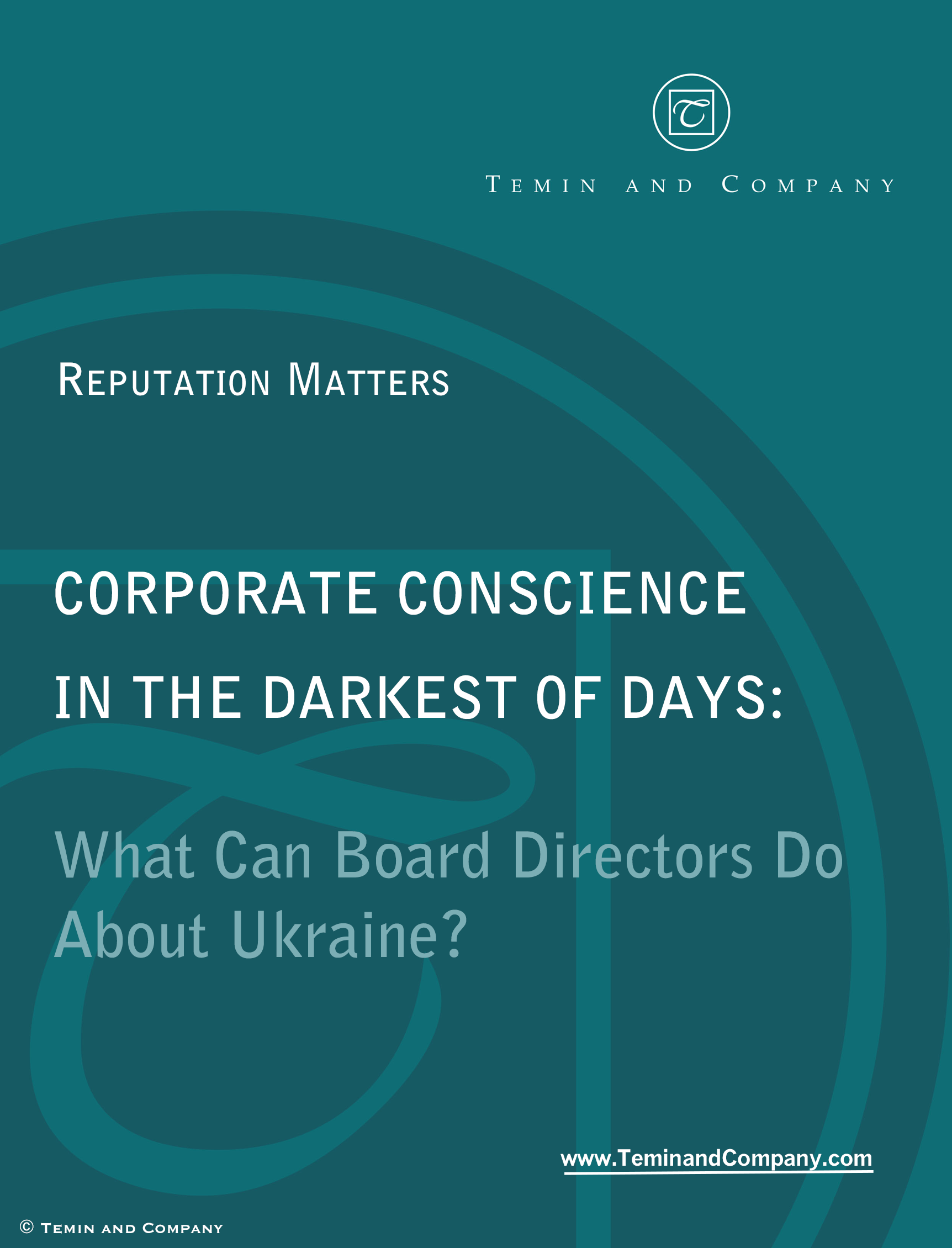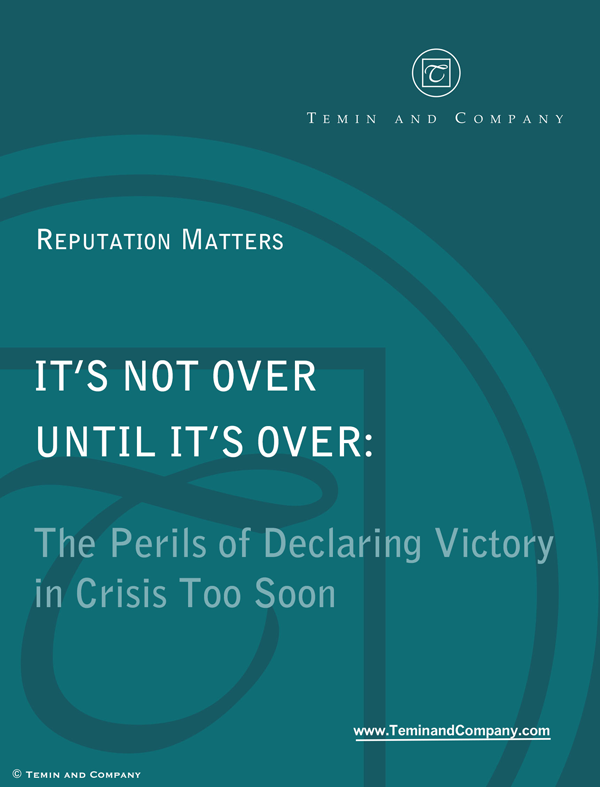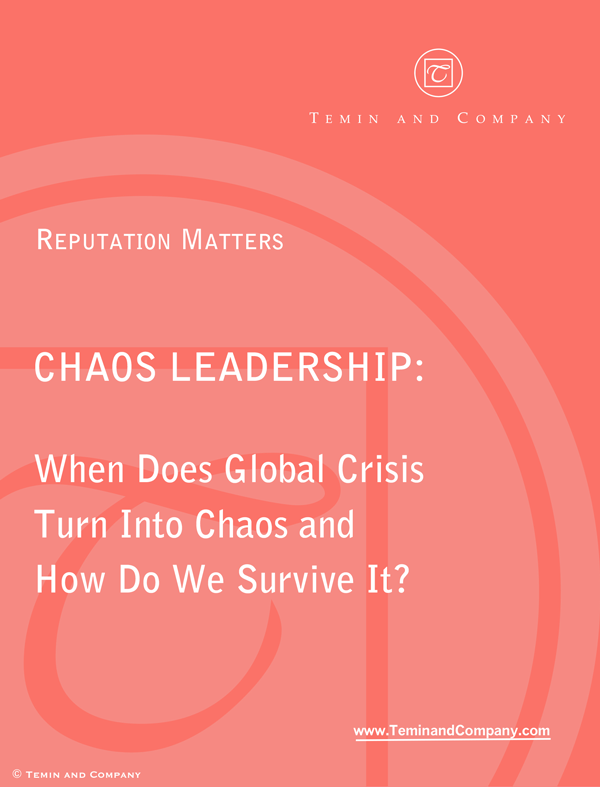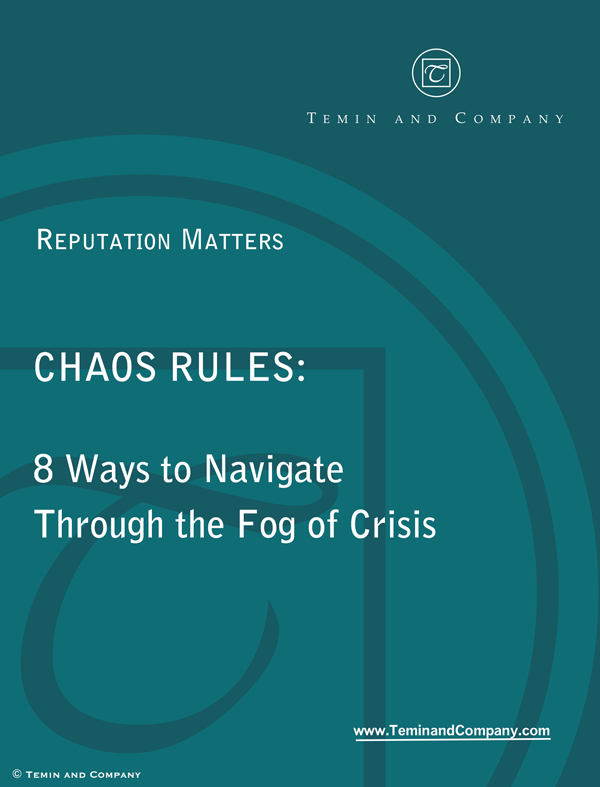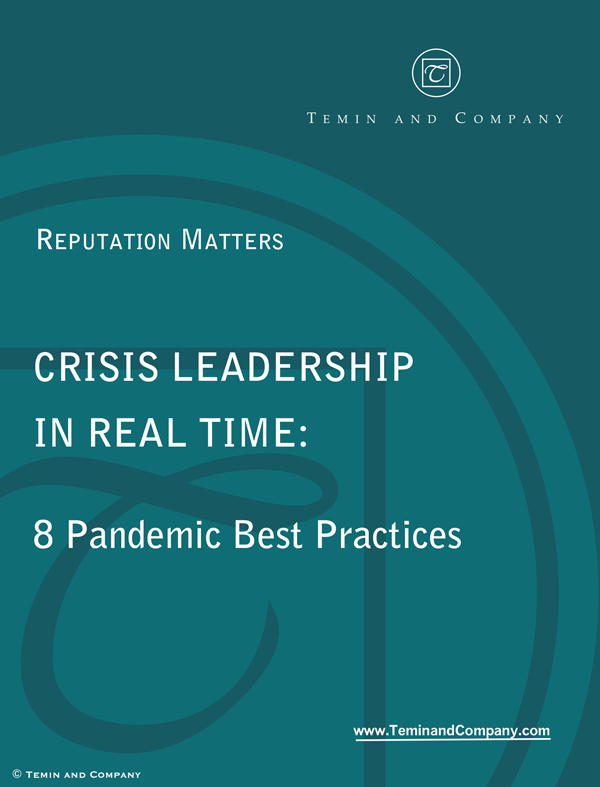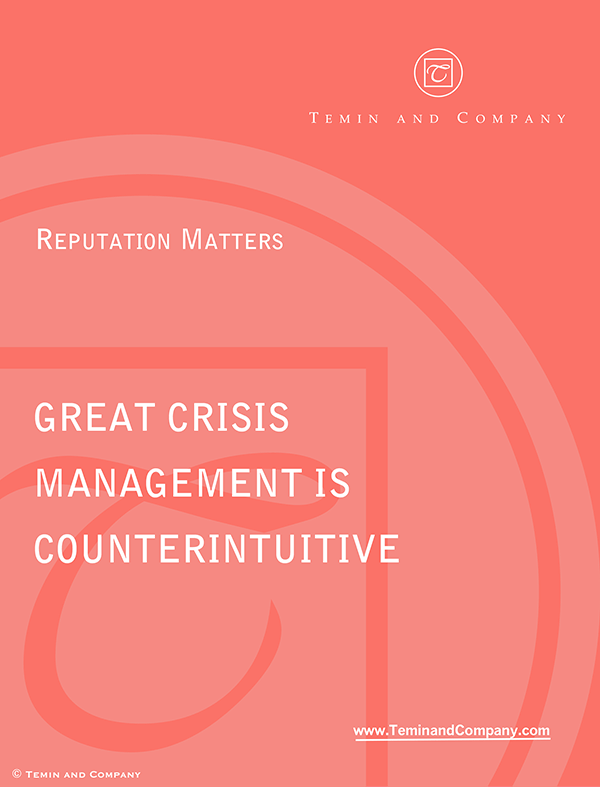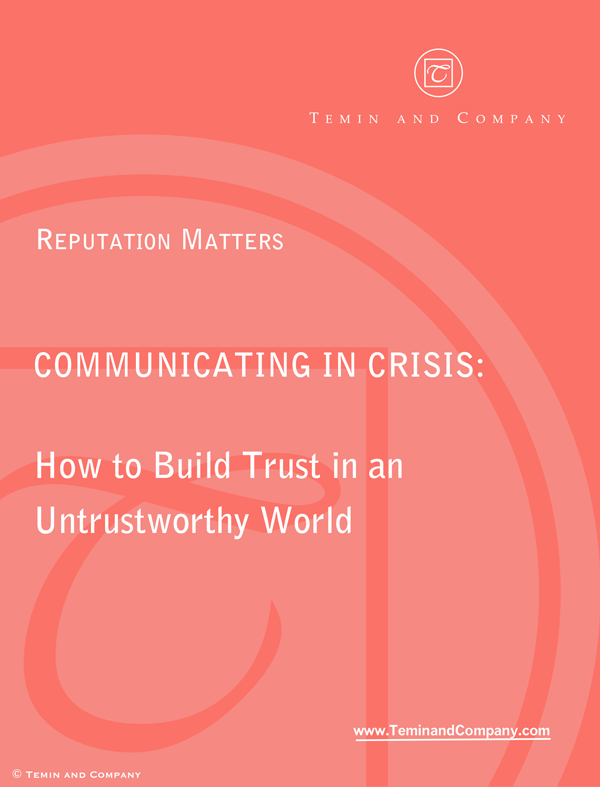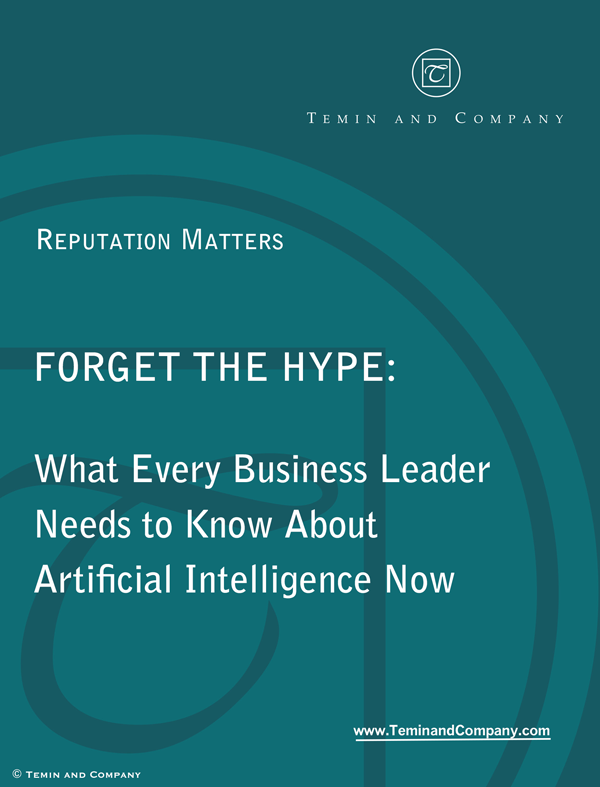Thought Leadership–Reputation Articles
White Papers»
"Reputation Matters" White Papers seek to offer deeper insight on a wide range of topics we help clients address.
11 Attributes To Look For In Your Crisis Manager
Leadership, “Reputation Matters,” Forbes, January 16, 2024
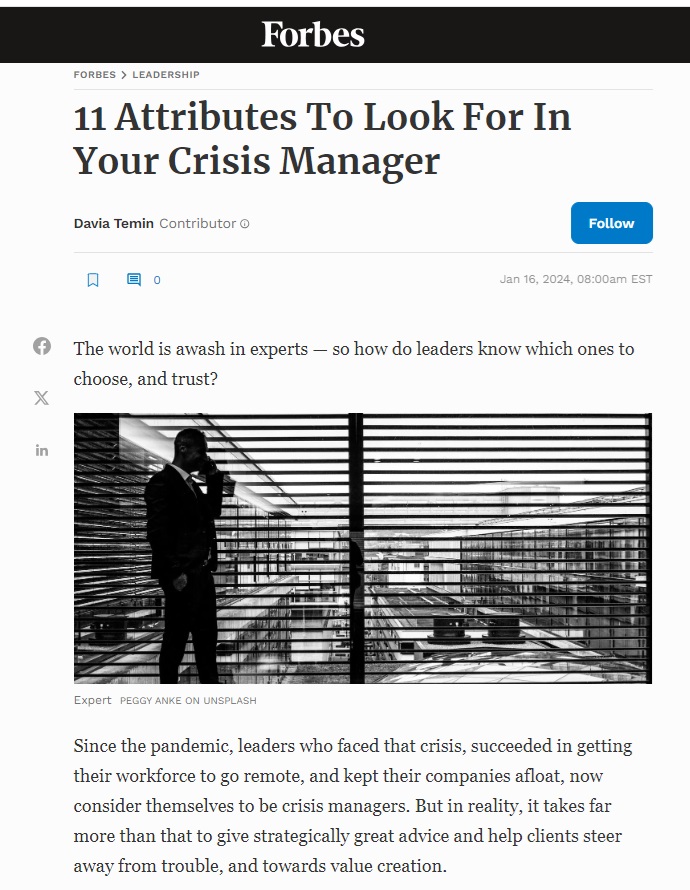
The world is awash in experts — so how do leaders know which ones to choose, and trust?
Since the pandemic, leaders who faced that crisis, succeeded in getting their workforce to go remote, and kept their companies afloat, now consider themselves to be crisis managers. But in reality, it takes far more than that to give strategically great advice and help clients steer away from trouble, and towards value creation.
In the first part of this two-part series we discussed how to judge judgment. After decades serving as a trusted strategy and crisis advisor to leaders in hundreds of different industries, settings, and situations, here are 11 stress-tested suggestions for how leaders can recognize whose advice to trust, and who to turn to in crisis. […read more]
Judging Judgment: How Can Leaders Know Whose Advice To Trust In Crisis Situations?
Leadership, “Reputation Matters,” Forbes, January 15, 2024
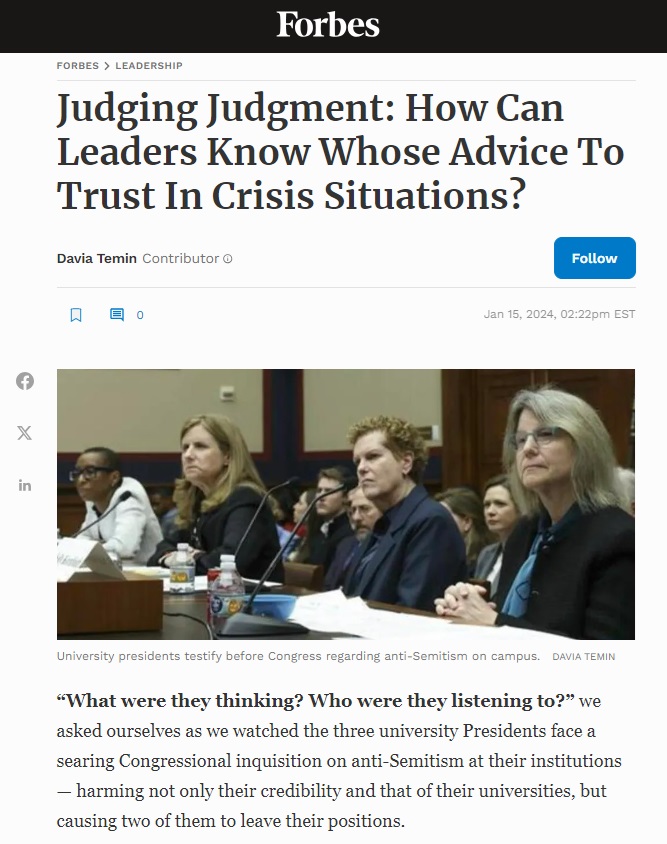
“What were they thinking? Who were they listening to?” we asked ourselves as we watched the three university Presidents face a searing Congressional inquisition on anti-Semitism at their institutions — harming not only their credibility and that of their universities, but causing two of them to leave their positions.
While the Presidents of MIT, University of Pennsylvania, and Harvard gave strong, elegant and convincing opening statements — all of which seemed strikingly similar — their advantage was dissipated during the questioning, which was notable for its toughness, but also for pushing the Presidents into a trap that was almost impossible to escape.
‘Yes or no’ they were told to answer by Representative Elise Stefanik, did the cries of “Intifada” on their campuses — taken to mean death to Israel and Jews — constitute bullying and harassment, and were thus against the rules of their universities?
The Presidents were basically asked the impossible question of the decade on college campuses — to choose between free speech and the banishment of hate speech that calls for violence. The question demanded strong, emotionally intelligent but institutionally decisive answers. And absolutely everyone knew that the question was coming. The need was for real answers, not verbal gamesmanship. Yet, the Presidents just were not prepared to answer the questions decisively and resonantly; they kept reverting back to the idea that there was no one answer — such bullying had to be taken “in context.” […read more]
The Nobel Prize Takes Aim Against Disinformation, Lies And Fakes
Leadership, “Reputation Matters,” Forbes, May 26, 2023
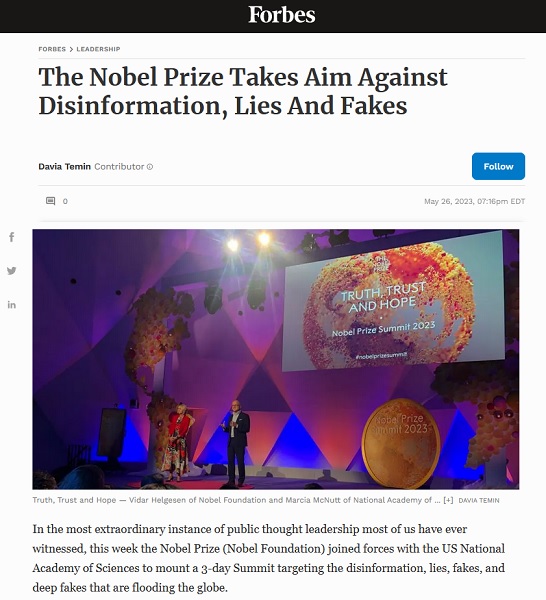
In the most extraordinary instance of public thought leadership most of us have ever witnessed, this week the Nobel Prize (Nobel Foundation) joined forces with the US National Academy of Sciences to mount a 3-day Summit targeting the disinformation, lies, fakes, and deep fakes that are flooding the globe.
The stakes could not be higher. From one-on-one ad hominem attacks, to the state-sponsored reputation destruction of political enemies, to the wholesale targeting of scientific findings, research and inquiry, disinformation campaigns are challenging our principles, truths — and souls. And, of course, social media and AI-enabled mimicry exacerbate the problem, putting our cognition more and more at risk. At their worst, they challenge our very understanding of reality, as well as our ability to trust anyone or anything.
Once there is no certainty to be found on the shifting sands of lies, trust dies a hard and ugly death.
So, who better to lead the charge than The Nobel Foundation and the National Academy of Sciences? In this three-day tour-de-force, titled “Truth, Trust and Hope,” they convened Nobel Prize laureates, notable experts, poets, artists, musicians, and even magicians to call out the problems caused by purposeful disinformation and truth destruction. […read more]
Reassessing The Role Of Empathy In Tech: Between Zuckerberg’s “Feeling Your Pain” And Musk’s Creating More Of It, What Works For Layoffs?
Leadership, “Reputation Matters,” Forbes, November 30, 2022
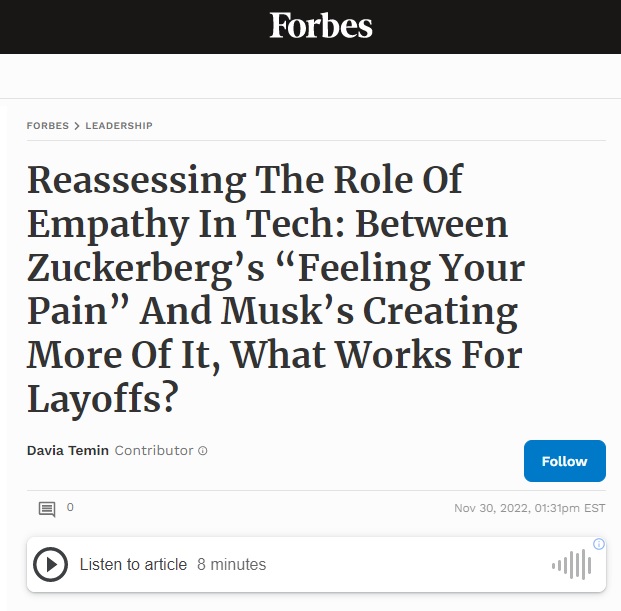
“Kind, creative, and smart is the motto at Snapchat…Looks like that went out of the window right away when things started going bad,” wrote one worker after CEO Evan Spiegel announced the layoffs of 1,200 employees this year.
As more and more tech layoffs are hitting before the holidays, the real question is — are empathy and “emotional intelligence” truly sustainable as business practices in bad times as well as good? Or have we just been paying them lip service?
Over the last year, TechCrunch estimates over 85,000 tech sector workers have been laid off from 35 companies, with more to come. Twitter, Meta, Amazon, Stripe and Salesforce have each adopted different strategies on how to do it. But none of them have gotten it “just right” yet. And some have gotten it mightily wrong. […read more]
Corporate Conscience In The Darkest Of Days: What Can Board Directors Do About Ukraine?
Leadership, “Reputation Matters,” Forbes, March 11, 2022
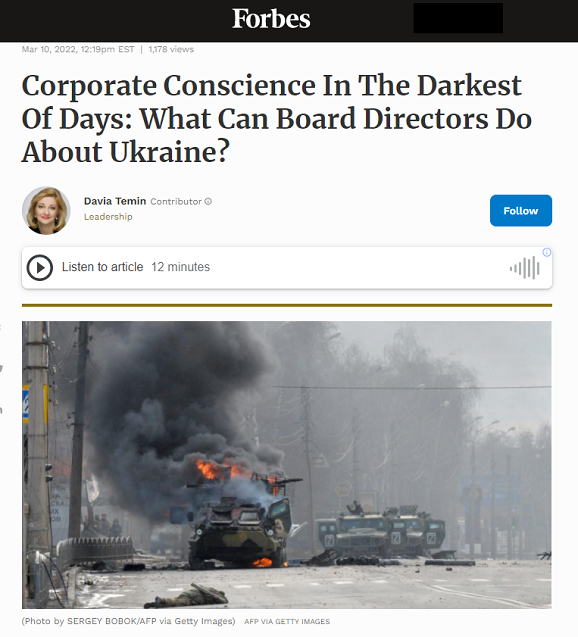
Over the years, the obligation organizations, their employees, customers, and stakeholders have felt to address — and redress — tragic wrongs in society has grown and grown.
Corporate social responsibility has been a topic for decades. But it is only now, as the concept of B corps (a designation that a business is meeting high standards of verified performance, accountability, and transparency) has intersected with the dereliction of various countries and their leaders to “do the right thing,” that companies have truly begun to find their voices. Often, they have needed to become the only adults in the room.
“#MeToo,” the murders of George Floyd and other black men and women caught on video, racism as a whole, atrocities at our border separating parents from their children, climate change and its devastating consequences, the importance of vaccines to fight the pandemic, and the pandemic itself — are all examples of controversial, politicized issues some corporations have begun to weigh in on.
Whether those issues directly involved the company or not, some leaders — management and board-level — chose to speak out. It is as if companies now not only have their own “brands” and “reputations,” they are developing their own personalities that they must stay true to: the company as global citizen. The corporate conscience. […read more]
Netflix CEO’s “Non-Apology Apology” Over Dave Chappelle Show Misses The Mark As Sarandos Struggles To Navigate Culture Wars
Leadership, “Reputation Matters,” Forbes, October 20, 2021

No one has ever said that being CEO was easy. And today, as the top leadership role has expanded to encompass “spinner-in-chief” — getting the message right becomes mission-critical.
But, as Netflix CEO Ted Sarandos is so publicly finding out, this is awfully hard to do, especially when you’ve placed yourself squarely in the middle of the culture wars.
And you know what, “Voice-of-God,” “from-the-mount” proclamations do not work so well anymore. Sensitivities are on high alert. Inclusion means that you really have to listen and be sensitive to diverse voices, even when you disagree. And you need to communicate to all of your key audiences orders of magnitude more than you ever had to before. So it’s hard. And the rules are changing fast. […read more]
Disney Ignites A Firestorm By Dissing Scarlett Johansson: How To Damage An Iconic Company Brand In One Move
Leadership, “Reputation Matters,” Forbes, August 1, 2021
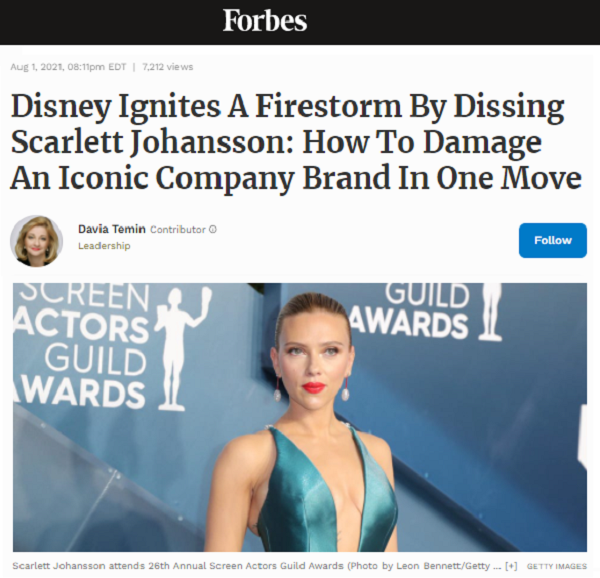
Disney just shocked the industry, movie goers, Marvel fans, Scarlett Johansson lovers, and media watchdogs alike with its unnecessary, nasty response to Johansson’s suit regarding “Black Widow’s” changed distribution plans.
Instead of taking the high road in their public response to what is essentially a business matter — albeit an important financial one — they decided to go low and go mean. And in so doing not only have they angered industry leaders like Johansson’s agents at CAA, action movie fans, and women’s rights advocates, they have seriously put a dent in their reputation with their “un-Disney-like,” off-brand behavior. Nasty, mean-spirited ad hominem attacks are just not what the public expects from Disney, or Marvel. These are supposed to be the good guys, after all. […read more]
Chaos Rules: 8 Ways To Navigate Through The Fog Of Crisis
Leadership, “Reputation Matters,” Forbes, April 3, 2020
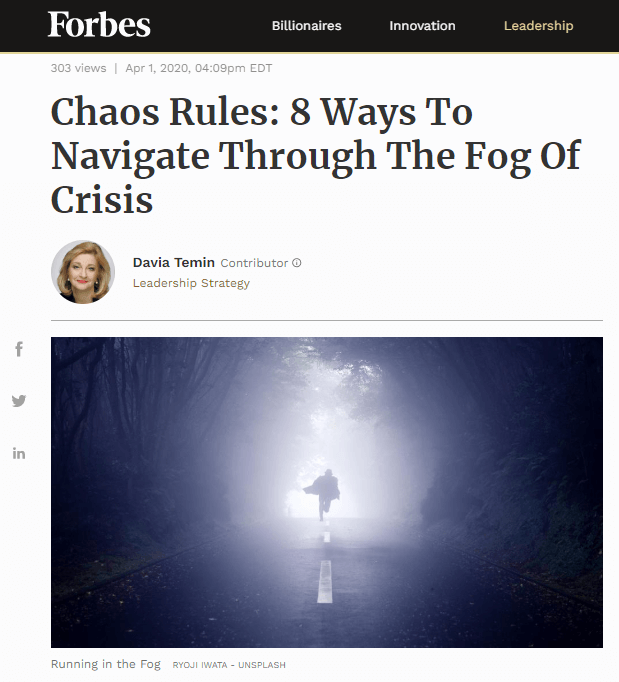
In wartime they call it the fog of war.
In crisis I call it the fog of crisis — but what it really amounts to is chaos.
So as we’re surrounded by a deteriorating civic infrastructure and national political response; as our lives and businesses are put on indefinite hold; as working indefinitely from home becomes untenable in many situations and organizations; as family pressures or the pain of isolation mount when we’re all sequestered at home; as joblessness careens; as the products we need the most – in hospitals and in our own lives – continue to be unavailable; and as more people get sick and die (this time, who we know) — the result is the fog of the coronavirus crisis.
It’s murky, dense and difficult to navigate. And it probably will exceed most of our abilities to cope at one time or another.
Chaos Rules
So, here are 8 ways that might help you get through it… [read more]
Chaos Leadership: When Does Global Crisis Turn Into Chaos And How Do We Survive It?
Leadership, “Reputation Matters,” Forbes, March 27, 2020
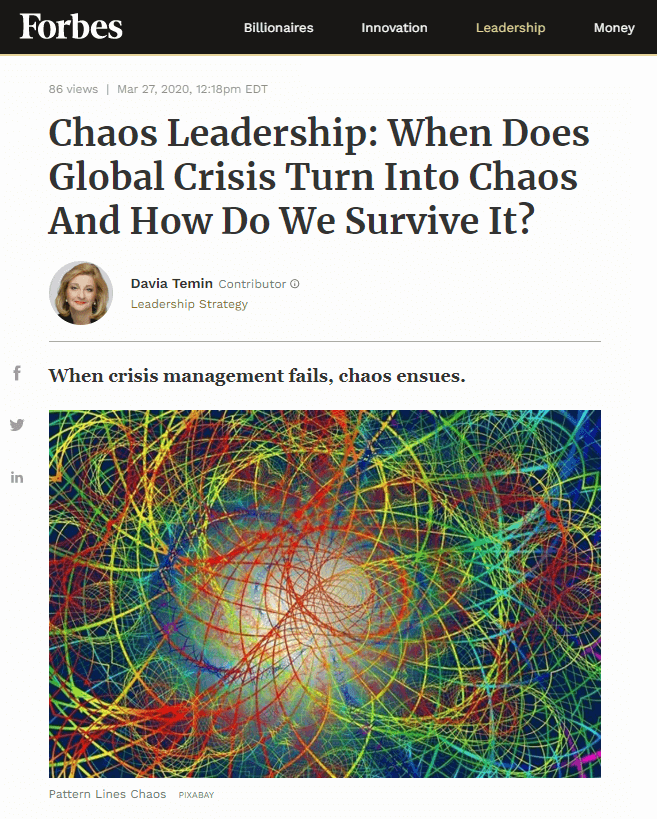
As we balance on the cusp between global crisis and total chaos — and we could make the jump into full-bore chaos at any moment — it is time to explore the difference between the two.
It also is time to talk about how the rules for handling chaos differ substantially from those that govern crisis response. Because if we cling to crisis management rules in order to address chaos, it will be as ineffective as if we treat coronavirus the same way we treat the common cold. […read more]
Expert Advice From Front-Line Physician On Leadership Needed To Combat COVID-19
Leadership, “Reputation Matters,” Forbes, March 18, 2020
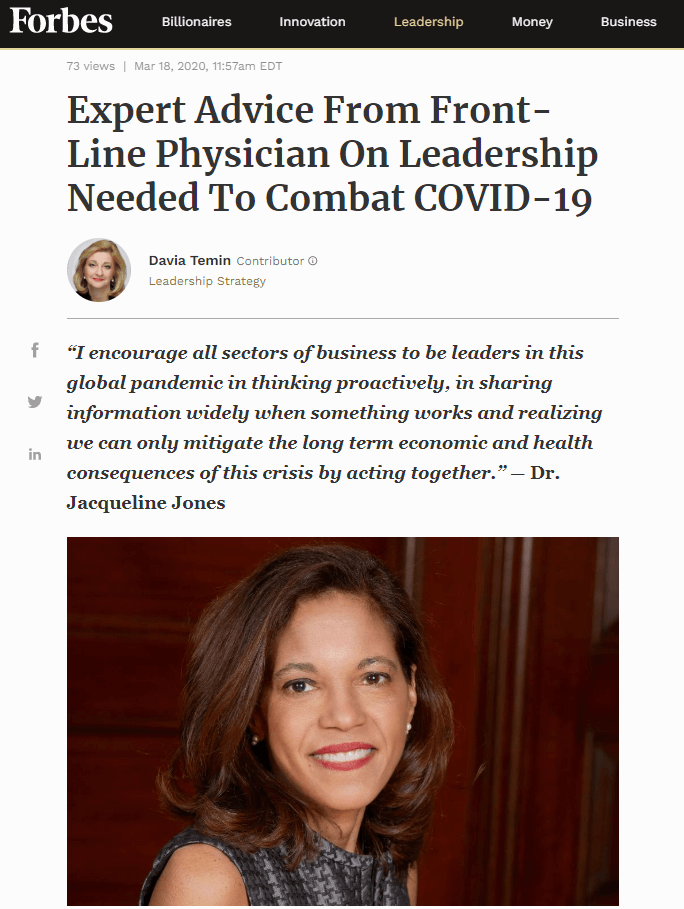
Earlier this week I wrote about Communicating in Crisis – Building Trust in an Untrustworthy World, and ended with the suggestion that true expertise and expert advice are critical to building trust. But it is almost impossible to sort out the expertise from all the misinformation floating about out there.
So, I asked my own trusted physician, Dr. Jacqueline Jones, one of the country’s leading ENT specialists, currently on the front-lines of fighting COVID-19 especially in children, for her expert advice. She shared it, both for patients, and for leaders in business, insurance, and medicine — and it is excellent. I would like to share it with you now. […read more]
White Papers»
"Reputation Matters" White Papers seek to offer deeper insight on a wide range of topics we help clients address.




